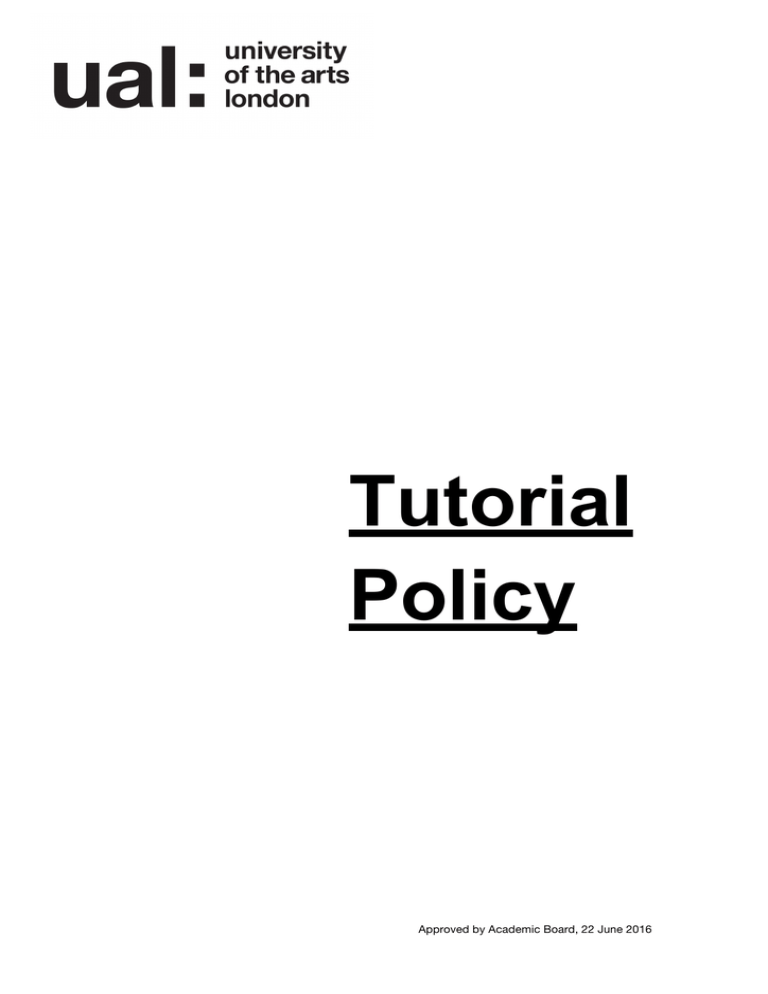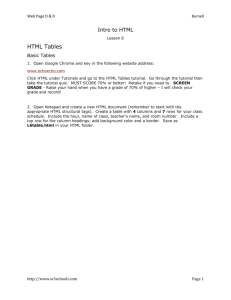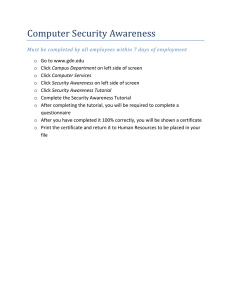Tutorial Policy - University of the Arts London
advertisement

Tutorial Policy Approved by Academic Board, 22 June 2016 1 Introduction 1.1 The Policy provides a framework and the principles for an integrated tutorial provision across the University’s taught courses, and a guideline as to how it should operate in practice, expressed as responsibilities at all levels. 1.2 The Policy situates tutorials within the learning, teaching and assessment experience of the course and recognises that tutors play a vital role in the early identification of issues and associated support needs. It includes the offer of advice on additional academic support, non-academic matters, and referral to relevant student support services, as appropriate. 1.3 The Policy acknowledges that individual and group tutorials are highly valued by students, primarily as an enabler of their academic progress. The policy enshrines the adaptability and orientation of tutorials according to students’ personal and professional development needs, level of study and aspirations. 1.4 The Policy is supported by advice, information, FAQs, exemplars and templates in a Tutorials section of the staff intranet (i.e. MyArts), and by information for students in a Tutorials section of the student version of the site; it is also supported by links and information about the range and remits of the University’s student facing services. 2 An Integrated Tutorial Provision Tutorials are offered primarily in the course context. Students may be recommended or referred to additional support offered by a range of services, which are co-ordinated at university level but based in colleges and attuned to course contexts. Tutorials in the course context 2.1 • • All courses provide structured timetabled opportunities for individual and group tutorials; Tutorials enable focused discussion to explore academic work, practicalities, understandings, progress, project supervision, assessment outcomes, direction, issues, and plans as appropriate in individual and group sessions; 2 • • • • Tutorials are face-to-face or online as appropriate to students’ circumstances; All courses include drop in and/or online opportunities for impromptu advice and guidance on academic or non-academic matters; Individual tutorials may be orientated by the student or tutor towards personal, professional or specific matters as necessary and appropriate; Tutorial provision is conceived and developed as a core element in course and curriculum design, teaching, and learning. Additional support services 2.2 • • • 3 Individual and group sessions are offered by Academic Support lecturers and librarians, and English Language Support tutors. These are designed to underpin academic progress and personal development, through focus on approaches to learning and improving study practices and skills, to be applied in the course context; Individual specialist study skills tutorial sessions and mentoring are provided by the Disability Service to students with specific learning difficulties (e.g. dyslexia) and long-term health/mental health conditions, or other impairments; Individual sessions, including urgent appointments for students in distress, are also offered by student services specialists in e.g. financial/immigration advice, disability advice, health advice, counselling, and pastoral support. Tutorials in principle Core principles apply to the provision as a whole, to course offers, and to the individual tutorial. All should be: • • • • • • Sensitive Fair Responsive Constructive Discursive Timely 3 4 Tutorials in practice: planning Students are entitled to a range of timely and appropriate support. A Course Tutorial Plan for provision that fits the needs of the students in all stages/units of the course should be developed, explicitly defined and communicated, in collaboration with the Programme Director; a template for a Course Tutorial Plan is provided online here. These are collated annually by the College Associate Deans of Learning and Teaching. The following factors should be taken into account in planning tutorial provision at course level: • The student profile: mode of study, diversity, anticipatory equalities duties • Course structure: transition, planning and decision points, levels of study • Timing: formative and post summative assessments • Regularity of contact through timetabled tutorials • Responsiveness through open tutorial opportunities • Flexibility for students with additional needs (e.g. Individual Support Agreements) • Balanced combinations of individual tutorials and group discussions • Tutorials for students at distance NB. UAL Placement Policy includes the need for points of contact • Continuity of support if tutorial responsibility is transferred in year • Adequacy: using an appropriate proportion of contact hours for tutorials • Staff workload planning and tutorial group sizes • Appropriate space planning 5 Tutorials in practice: learning, teaching and support The following factors should be addressed in inducting tutors and delivery of tutorials: • Student choice of orientation (academic, pastoral, directional, specific issue) in individual tutorials • Inclusivity: reasonable adjustments, timing, clear and accessible English • Dialogue and student participation, especially in group tutorials • Preparation, agenda setting, documentation and feedback (use of forms by student and tutor) 4 • • • Recognising additional needs, making referrals, record keeping of referrals Maintaining boundaries and appropriate confidentiality Follow up on non-attendance, re-scheduling 6 Staff development and communications 6.1 All academic staff, including hourly paid Associate Lecturers with tutorial responsibilities, (and professional, technical and administrative staff as appropriate) should receive annual updating on tutorial provision in the course or programme context, and be proactive in ensuring they are informed. 6.2 Staff development and accessible online guidance in accordance with the Tutorial Policy implementation should be available (e.g. for development of Course Tutorial Plans, ensuring inclusive practices, making effective referrals etc.) 6.3 Student Services teams offer advice, consultancy and bespoke development sessions for staff across the university; staff development needs should be discussed and arranged with appropriate Heads of Service. 6.4 Communications with students should clarify tutorial provision in inductions, briefings, handbooks, Moodle sites and on timetables and include reference to additional student support in the local and university-wide context. Student responsibilities and protocols in support of a productive tutorial relationship should also be explained. Tutorials should also be referenced as appropriate in recruitment and pre-arrival communications and activities where relevant understandings, skills and expectations can be introduced. 7 Monitoring and review 7.1 University and College Learning Teaching and Enhancement Committees will retain overview of the implementation, value and impact of the Policy, receiving overview reports at the autumn term meeting. 7.2 Student engagement in timetabled tutorials will be recorded and 5 student feedback on the provision will be collated through unit evaluation and course-specific feedback mechanisms. Students should also have the opportunity to comment on the description of tutorial provision in the student facing section of the Course Tutorial Plan prior to its annual re-presentation. 7.3 Tutorial provision will be monitored and addressed at college level according to the University’s risk-based quality processes. 7.4 Tutorial provision as part of curriculum design, teaching and learning may be highlighted in the agenda for course review; the Course Tutorial Plan should be considered in course validations. 8 Responsibilities for implementation of the Tutorial Policy Tutorials require all participants to take appropriate responsibility as indicated in the following guideline. 8.1 Students are responsible for: 8.1.1 Preparation, attendance and punctuality, informing the course as soon as possible if unable to attend a timetabled tutorial, whether individual, group, face-to-face or online. 8.1.2 Abiding by the UAL Student Charter and codes of conduct, and participating constructively in tutorials with good will and respect for staff and peers. 8.1.3 Making clear any desired focus or orientation of the tutorial, informing the tutor in advance if possible, if particular preparation is implied. 8.1.4 Preparing an agenda and documenting their tutorial as briefed in their course context. 8.1.5 Reading and reflecting on advice received, following-up on actions agreed, and seeking further clarification or support if necessary. 6 8.2 Tutors are responsible for: 8.2.1 Preparation for individual and group tutorials familiarising themselves as far as possible regarding the student/s’ progress or needs prior to the tutorial. 8.2.2 Being available at the stated time and place whether for faceto-face or online, timetabled or drop in tutorials, and for rescheduling (in liaison with the course leader or equivalent) if he or she has been unavoidably absent. 8.2.3 Facilitation of the student’s orientation of the tutorial as necessary, whether or not pre-advised. Supporting the student’s participation in the tutorial. 8.2.4 Ensuring essential matters are addressed in accordance with the Course Tutorial Plan. 8.2.5 Enhancing all students’ sense of belonging, engagement and contribution, through support for participation and dialogue in tutorials as part of an inclusive learning community. 8.2.6 Providing constructive feedback. The tutor should not use tutorials primarily to inform themselves of the student’s activities. 8.2.7 Ensuring appropriate documentation of tutorials by or with the student, prompt upload and follow up communication as necessary. 8.2.8 Awareness of continuity of support for students, taking account of previous reports and using language that is clear and consistent with criteria that will be evident in assessment feedback. 8.2.9 Ensuring personal boundaries of all students and themselves are respected and that any needs beyond the tutor’s remit are recognised. 8.2.10 Informing themselves of the range and remits of additional student services so that they can encourage students to seek appropriate academic, disability or other support and make 7 effective referrals. Additional support recommended or any referral should be explained to the student and noted on the report. 8.3 Course/Stage Leaders (or equivalents) are responsible (in liaison with the Programme Director and with administrative support) for ensuring: 8.3.1 Planning and scheduling appropriate tutorial provision as in 4 above, at course level, using the Course Tutorial Plan, completing and amending it to ensure accurate and timely communications to tutors and students. 8.3.2 All tutors providing tutorials are briefed before undertaking tutorials as per 6.1 above, focusing on the Course Tutorial Plan, provided with access to student records/reports, and equipped to fulfill requirements as in 5 above, including making effective referrals, understanding boundaries, documentation and reporting, tracking and follow up communications. 8.3.3 Communications with students as in 6.4 above are up to date and continuously implemented; students’ feedback on tutorial provision, and the explanation of it, is gathered and used coconstructively to enhance students’ experience. 8.4 Programme Directors are responsible for: 8.4.1 Working collaboratively with course leaders/equivalents, teams and administrative support to ensure development, delivery and communication of appropriate provision, as per 6.1 and 8.3 above, using the Course Tutorial Plan. 8.4.2 Overseeing the annual updating of the Course Tutorial Plans within the Programme , ensuring appropriate proportions of course contact hours are committed to tutorials and that changing conditions and student feedback are taken in to account. 8.4.3 Ensuring parity in staff workloads and student experience of tutorial provision across cognate courses/pathways in the Programme, and a transparent rationale for variations. 8 8.4.4 Ensuring that all tutorial providers within the Programme are informed of College Academic Support provision and UAL-wide support services. 8.5 Deans of Academic Programmes/Schools/Colleges in liaison with Associate Deans as appropriate are responsible for: 8.5.1 Ensuring that an appropriate proportion of allocated teaching budgets to Programmes, and thence to courses, is dedicated to tutorial provision. 8.5.2 Supporting Programme Directors in resource planning for tutorial provision across cognate courses, ensuring rationales for variations are contextually sound and transparent. 8.5.3 Appropriate spaces for individual and group tutorial provision and management of prioritisation where necessary with regard for anticipatory equality duties and diversity. 8.5.4 Ensuring that Programme Directors are fully informed about University support services and local arrangements. 8.6 College Associate Deans of Learning and Teaching in liaison with Programme Directors and Quality Managers (Academic Registry) are responsible for: 8.6.1 Collation of Course Tutorial Plans annually, and maintaining an overview of areas of good practice and areas for development, supporting related enhancement activity, and making an overview annual report to University Learning and Teaching Committee (7.1 refers) 8.6.2 Overseeing the accuracy and clarity of tutorial provision and expectations described in course handbooks, and ensuring college and university-based providers of communications, recruitment, student services and academic support are updated as necessary. 8.6.3 Use of the Course Tutorial Plan if relevant in continuous monitoring, and support for its use and development in course 9 review and validation processes. 8.7 The Teaching and Learning Exchange is responsible for: 8.7.1 Staff development and continuing professional development in tutoring capabilities and the tutorial relationship, and recognition for tutorial responsibilities. 8.7.2 Provision of core online guidance for staff and for students. 8.8 Academic Registry in collaboration with the Teaching and Learning Exchange is responsible for: 8.8.1 Ensuring at college level that tutorial provision is monitored as appropriate through the university’s risk-based quality processes, and that the Tutorial Policy is reflected in course developments. 8.8.2 Supporting the provision of online core guidance and customisable templates for support of staff delivery and students’ participation in tutorials in collaboration with the Teaching and Learning Exchange. (1.4 refers) 8.9 The office of the University Dean of Students together with leaders within Academic Registry, Student Services, the Teaching and Learning Exchange, and Libraries and Academic Support are responsible for: 8.9.1 Ensuring UAL-wide services communicate related student support offers, systems and procedures, staff development provision and opportunities, and other relevant updates effectively with each other and with Colleges. 10



